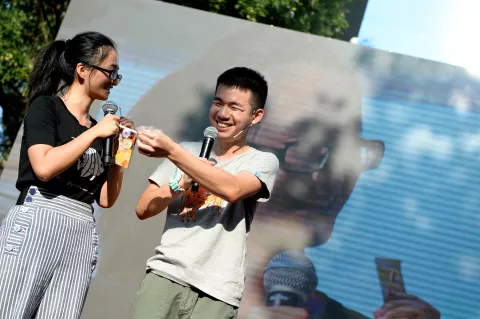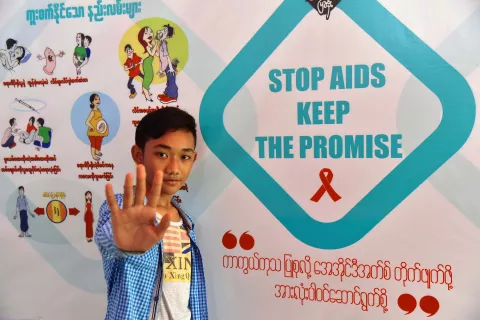Break the silence
It does not protect children
- Available in:
- 中文
- English
Aduo could not imagine any hope.
“I know it is not curable so I am not taking my three children to take an HIV test,” she told the village child welfare director, Rezuo, during a home visit.
“My husband was diagnosed HIV-positive three years ago. He is all right, but, easily gets tired. I was tested HIV-positive last year during a mass screening by the local disease control centre. I am still strong and can manage the farm and housework. No one in our village knows of our HIV status. We didn't tell our children either. We don't want to frighten them. I think that keeping the silence may protect them from being excluded.”
Rezuo could not imagine living in such silence.
With training and a monthly stipend from the civil affairs bureau and UNICEF, she monitors all 340 children in her village, trying to keep up with the social support that is needed and to coordinate social services for children in need, including treatment and allowances for children with HIV. Rezuo lives in a small village in a mountainous area in Southwest China, where adult HIV prevalence is estimated at around 5 per cent. In April, during a training organized by the child welfare project, which is supported by UNICEF and the Ministry of Civil Affairs, Rezuo learned about the importance of early testing, treatment and prevention of HIV and that the Chinese Centre for Disease Control and Prevention (through local hospitals) provides free HIV testing and treatment, while the local civil affairs bureau provides 600 yuan in allowances to children with HIV every month. As a child welfare director, also called a barefoot social worker, she passed all that she learned to every parent in her village in the hope of breaking through some of the silence to help better protect children and parents living with HIV.
“Like Aduo, most people in the village know that HIV is not curable and that it will not kill immediately,” she explained. “So people choose to ignore their status and avoid to talk about it with their children or to take them to do an HIV test. We don't have a village doctor here, and I am not a medical person. But, someone has to break the silence to save the lives of our children together.”
She has yet to convince Aduo to take her three children for testing but several other parents and their children, as well as Rezuo and her daughter, have been tested – some who have since enrolled in the HIV treatment programme.
Note: The name of the HIV/AIDS affected woman is changed in this article to protect her privacy.



